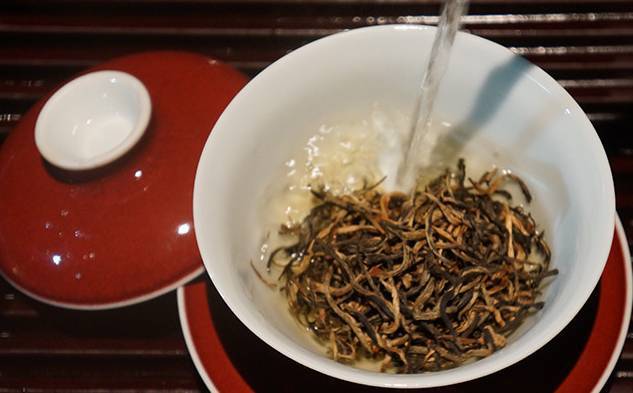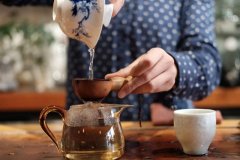Song species Huangzhixiang Dancong Oolong is better to brew tea with soft water or hard water? Why is it good to drink?
Instead of using a panel of experts, a US study used a large group of typical tea consumers to determine the effects of the chemical composition of water on tea making (Franks et al. 2019). The results are basically the same as the previous studies: soft water can extract more catechins, and it has a greater effect on the taste of green tea than black tea. However, unlike other studies, these team members preferred tea brewed in hard water. The author believes that this difference is due to the fact that "the tastes of a small group of Chinese experts are different from those of a large group of American tea consumers." For the American team, the bitterness of green tea brewed in soft water increased, making it less delicious. The researchers continue to suggest that if you drink tea for health reasons, then you should use deionized water, and if you are drinking tea for the taste of tea, then ordinary tap water may be better for most consumers.

In cafes, baristas are most likely to choose the water they use to make coffee, which is either treated by reverse osmosis or filtered with a filter element. However, the traditional method of making tea includes several ways to treat water. Yu Xiuhua suggested adding a pinch of salt to remove the smell from the water, while some tea masters would add stones called "Maifan stone" or bamboo charcoal when making tea. These methods are often claimed to "purify" water, but in fact they may subtly change the mineral content of the tea, thus changing the taste of the tea. Although we have not found any peer-reviewed research in this area, tea writer Rie Tulali (2020) speculates that in many of these treatments, the common element may be silica. Toulali points out that high silicon water like Fiji improves the taste and aftertaste of tea, and bamboo is a well-known source of silicon. However, until we do more research on this issue, we are not sure whether silica is a mineral missing in the perfect tea formula. However, different studies do clearly show that minerals in water have different effects on different types of tea. For this reason, many tea experts recommend using softer water in white and green teas than oolong and black teas to produce the desired flavor of that kind of tea. For a strong cup of tea, you might even consider following Mrs. Beaton's advice, she wrote, "adding a few grains of sodium bicarbonate before boiling water is poured on the tea will help absorb the essence of the tea." However, for more refined teas that are popular in specialty coffee shops, you may find some new flavors instead of the water used to make coffee.
Important Notice :
前街咖啡 FrontStreet Coffee has moved to new addredd:
FrontStreet Coffee Address: 315,Donghua East Road,GuangZhou
Tel:020 38364473
- Prev

What kind of water should be used to brew Phoenix Dancong tea? Can soft water be used to make oolong tea?
Tea experts knew the importance of water quality when brewing coffee long before Caldy's imaginary goat tasted coffee for the first time. Lu Yu, an eighth-century tea master, loved springs. In his book the Book of Tea, he wrote: the best springs flow slowly on the stone pools on the primitive hillside. The use of suitable water to make tea is considered as
- Next

What is the most expensive tea? What grade does Jasmine Dragon Ball belong to? How much per catty?
Technically, tea aroma is a process that naturally alters the aroma and taste of tea. This is due to the hygroscopicity of tea (which means that tea absorbs moisture and aroma from its surroundings). Although many people think that only low-grade tea is used for smell, there are also many refined high-grade teas that have aroma and are highly flavored.
Related
- Unexpected! Ruixing Telunsu lattes use a smoothie machine to foam milk?!
- % Arabia's first store in Henan opens into the village?! Netizen: Thought it was P's
- Does an authentic standard mocha coffee recipe use chocolate sauce or powder? Mocha Latte/Dirty Coffee/Salty Mocha Coffee Recipe Share!
- What is the difference between Vietnam egg coffee and Norway egg coffee? Hand-brewed single product coffee filter paper filter cloth filter flat solution!
- What is the difference between sun-cured and honey-treated coffee? What are the differences in the flavor characteristics of sun-honey coffee?
- How to make Italian latte! How much milk does a standard latte use/what should the ratio of coffee to milk be?
- How to make butter American/butter latte/butter Dirty coffee? Is hand-brewed coffee good with butter?
- Is Dirty the cold version of Australian White? What is the difference between dirty coffee/decent coffee and Australian white espresso?
- Relationship between brewing time and coffee extraction parameters How to make the brewing time fall to 2 minutes?
- Got entangled?! Lucky opens a new store, Mixue Ice City, and pursues it as a neighbor!

